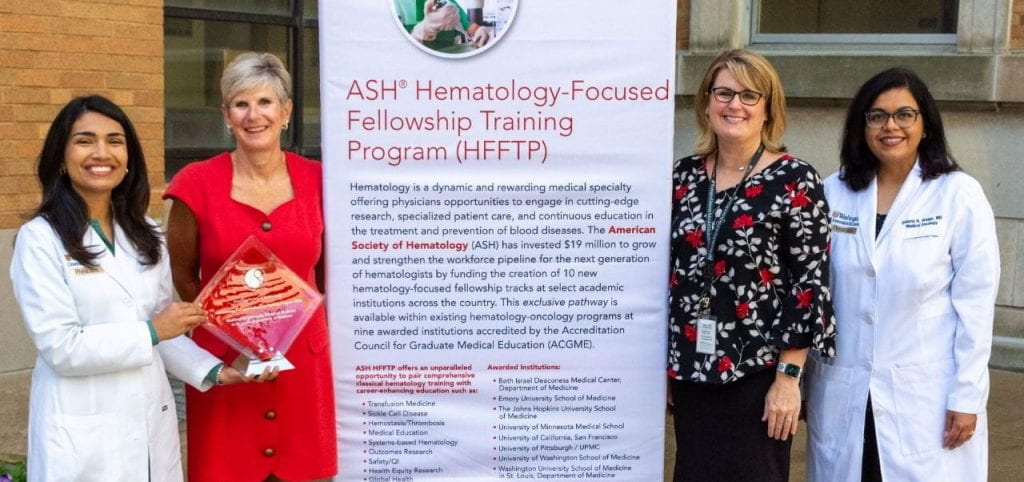
Background
American Society of Hematology (ASH) conducted a comprehensive longitudinal workforce study designed to examine the current hematology workforce and the existing pipeline of future hematologists. The need to increase the number of hematology-oncology fellowship programs designed to prioritize training in Hematology and promote careers in Hematology in the United States was one of the first identified priority.
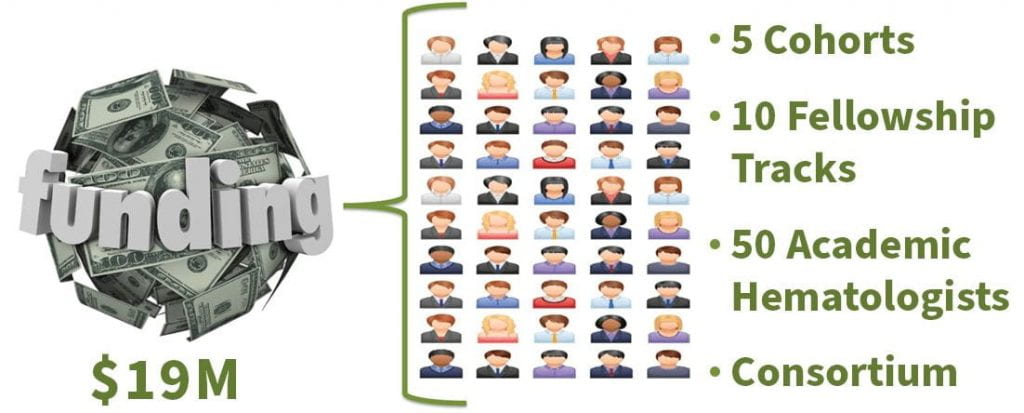
Washington University in St. Louis was one of 10 institutions in the U.S. awarded by ASH to create a new innovative hematology-focused fellowship track within an existing adult hematology-oncology training program.
Program Requirements
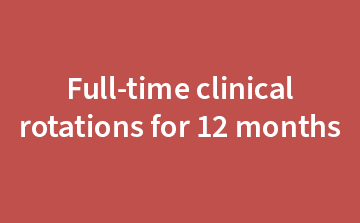
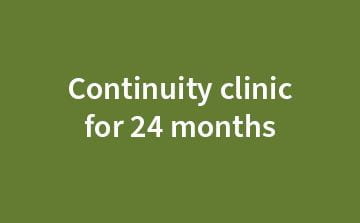
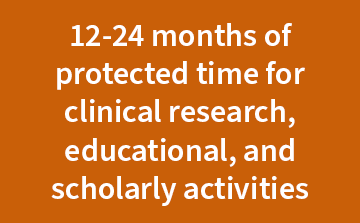
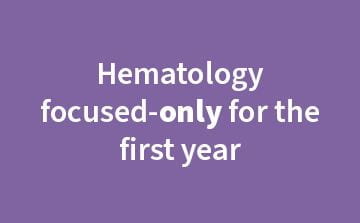
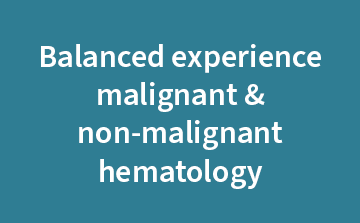
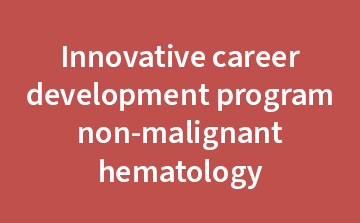
Tracks Offered
The three tracks offered include:
- The Hemostasis and Thrombosis Track: This track aims to integrate traditional training with rotations in our pediatric hemophilia, pulmonary, interventional radiology and vascular surgery multidisciplinary clinics as well as offers opportunities for both clinical and basic science research training with leaders in these fields via external rotations.
- The Hemoglobinopathies and Cellular Therapy Track: This track includes an innovative curriculum and training within our comprehensive sickle cell program with a dedicated inpatient sickle cell service, young adult transition program, and electives in pediatric clinics as well as close clinical collaborations with pain management with a specific focus on non-opiate therapy. The cellular therapy curriculum leverages the expertise of faculty under the robust Gene & Cellular Immunotherapy program of Bone Marrow Transplant and Leukemia in the Oncology Division with upcoming gene therapy protocols for curative intent in sickle cell disease. As one of the seven hubs for the recently established ASH Sickle Cell Disease Clinical Trials Network (SCD CTN), our fellows have the opportunity to develop expertise in conducting clinical trials in conjunction with the option to participate in a funded degree program in Master’s in clinical Investigation/Public Health Sciences.
- The Transfusion Medicine and Hematology Track: This track is administered in collaboration with the Blood Banking and Transfusion Medicine program, and fellows will be eligible for dual certification.
Several unique elements in our program aimed to promote academic careers for our fellows include a requirement for all fellows to design and develop a clinical trial during fellowship, an experience which is supported by our 4-week clinical trials didactics boot camp.
Hematology Clinical Training (12 months) Year 1
| Inpatient | |
| Hematology Consults (4.0 mo) BMT 8800 (1.0 mo) Sickle Cell Service (1.0 mo) | Hematology Clinics (6.0 mo) * |
Continuity Clinics
Six months in duration, each clinic one half-day per week
| Hematology Clinic (0.5 mo) | Hematology Clinic (0.5 mo) |
*Outpatient Hematology Clinics
- Fellows will participate in 5 half day clinics in addition to their continuity clinic.
- Disease specific clinics include thrombosis, MPN, sickle cell, MDS, multiple myeloma and lymphoma.
- There is a multidisciplinary hemophilia clinic on the first Thursday of each month in Dr. Majerus and Dr. Blinder’s afternoon clinics.
- There is multidisciplinary pulmonary embolism clinic on 3rd Monday of each month, will switch to weekly Friday clinic AY22.
- Adult and young adult multidisciplinary sickle cell clinics every Monday and Wednesday afternoon and Thursday mornings.
Transfusion Medicine (12 months) Year 2
| Inpatient | Outpatient |
| Inpatient Apheresis (11.0 mo) | Outpatient apheresis (includes Hematopoietic Stem Cell Collection) (1.0 mo) |
| Transfusion medicine rotations | Transfusion Medicine Didactics** |
| – Blood bank and Immunohematology (3.0 mo) – Donor room and manufacturing (0.5 mo) – Cellular processing, cryopreservation, and histocompatibility (1.0 mo) – Pediatric and neonatal transfusion medicine ( 1.0 ) – Coagulation (1.0 mo) – Elective (1.5 mo). – Elective time is tailored to individual fellow and includes research time. | – TM Journal Club/fellow will organize and coordinate – Laboratory and Genomic Medicine Grand Rounds BJ-IOH 4506 Noon-1 pm – Tuesday Case Conference attendance is mandatory – Perioperative Blood Management meetings – Transfusion Committee meetings |
| * Vacation time can be availed on any rotation | ** In addition to the hematology fellowship didactics. |
Research Training (12 months) Year 3
- Meet with research mentor every 4 weeks
- Meet with basic science and career development PD and mentor every 6 months.
- Participate in recurring clinical protocol review meetings based on disease focus
- Present poster on LOI project at winter symposium (January Year 2)
- Present oral presentation on LOI project at winter symposium (January Year 3)
- Apply for at least one of the following research awards: ASH CRTI, ASH RTAF, ASH TRT.
- Apply for National Blood Foundation, early career research Grant.
- Protected time to attend AABB annual meeting in addition to ASH.
- Write a career development plan and an NIH biosketch.
Continuity Clinics Year 3
6 months in duration, each clinic one half-day per week. Fellow can choose to stay in same clinic for whole year
| Hematology Clinic (0.5 mo) | Hematology Clinic (0.5 mo) |
Months of Research Training: 11 (includes vacation)
Hematology Clinical Training (12 months) Year 1
| Inpatient | Outpatient |
| Hematology Consults (4.0 mo) BMT 8800 (1.0 mo) Sickle Cell Service (1.0 mo) | Hematology Clinics (6.0 mo) * |
Continuity Clinics
Six months in duration, each clinic one half-day per week
| Hematology Clinic (0.5 mo) | Hematology Clinic (0.5 mo) |
*Outpatient Hematology Clinics
- Fellows will participate in 5 half day clinics in addition to their continuity clinic.
- Disease specific clinics include thrombosis, MPN, MDS, multiple myeloma and lymphoma.
- There is a multidisciplinary hemophilia clinic on the first Thursday of each month in Dr. Majerus and Dr. Blinder’s afternoon clinics.
- There is multidisciplinary pulmonary embolism clinic on 3rd Monday of each month, will switch to weekly Friday clinic AY22.
- Adult and young adult multidisciplinary sickle cell clinics every Monday and Wednesday afternoon and Thursday mornings.
Research/clinical Training (12 months) Year 2
| Electives (2.0 mo) | Vacation (1.0 mo) |
| Elective Rotations | Away Rotations |
| – Palliative Care (0.5 mo) – Sickle Cell (0.5 mo) – Pediatric Hem/Onc (0.5 mo) – Transfusion Medicine (0.5 mo) – Hematopathology (0.5 mo) – Cardio Oncology (0.5 mo) – Toxicology and Pain Medicine (0.5 mo) – Chemotherapy Management (0.5 mo) | – UCSD multidisciplinary hemophilia/point-of-care ultrasound program (1.0 mo) – Versiti Blood Research Institute, Milwaukee WI (2 weeks). Hemostasis and Thrombosis – Option for the hemophilia and bleeding disorders clinic being the continuity clinic. – Will participate in the weekly Pulmonary embolism half day clinic and attend PERT consultation and – Based on trainees interest, IR rotation can be a longitudinal training pathway as detailed |
| – Quarterly thrombosis conference. Annual bleeding disorders region VI meeting. |
Continuity Clinics Year 2
6 months in duration, each clinic one half-day per week. Fellow can choose to stay in same clinic for whole year
| Hematology Clinic (0.5 mo) | Hematology Clinic (0.5 mo) |
Months of Research Training: 9 (includes vacation)
Research Training (21 months) – Year 2 & 3
- Meet with research mentor monthly.
- Meet with Basic Science and Career Development PD and Mentor every 6 months
- Participate in recurring clinical protocol review meetings based on disease focus
- Present poster on LOI project at winter symposium (January Year 2)
- Present oral presentation on LOI project at winter symposium (January Year 3)
- Apply for at least one of the following research awards: ASH CRTI, ASH RTAF, ASH TRT, ASBMT CRTC
- Write a career development plan and an NIH bio sketch
Continuity Clinics – Year 3
6 months in duration, each clinic one half-day per week. Fellow can choose to stay in same clinic for whole year
| Hematology Clinic (0.5 mo) | Hematology Clinic (0.5 mo) |
Hematology Clinical Training (12 months) Year 1
| Inpatient | |
| Hematology Consults (3.0 mo) BMT 8800 (1.0 mo) BMT 9800 (1.0 mo) | Hematology Clinics (6.0 mo) * |
| Sickle Cell Service (1.0 mo) |
Continuity Clinics
Six months in duration, each clinic one half-day per week
| Hematology Clinic (0.5 mo) | Hematology Clinic (0.5 mo) |
* Outpatient Hematology Clinics
Fellows will participate in 5 half day clinics in addition to their continuity clinic.
- Disease specific clinics include thrombosis, MPN, MDS, multiple myeloma and lymphoma.
- There is a multidisciplinary hemophilia clinic on the first Thursday of each month in Dr. Majerus and Dr. Blinder’s afternoon clinics.
- There is multidisciplinary pulmonary embolism clinic on 3rd Monday of each month, will switch to weekly Friday clinic AY22.
- Adult and young adult multidisciplinary sickle cell clinics every Monday and Wednesday afternoon and Thursday mornings.
Research/clinical Training (12 months) Year 2
| Electives (2.0 mo) | Vacation (1.0 mo) |
| Elective Rotations | Away Rotations |
| – Palliative Care (0.5 mo) – Sickle Cell (0.5 mo) – Pediatric Hem/Onc (0.5 mo) – Transfusion Medicine (0.5 mo) – Hematopathology (0.5 mo) – Cardio Oncology (0.5 mo) – Toxicology and Pain medicine (0.5 mo) – Chemotherapy Management (0.5 mo) | – UCSD multidisciplinary hemophilia/point-of-care ultrasound program (1.0 mo) – Versiti Blood Research Institute, Milwaukee WI (1.0 mo). Sickle cell specific requirements – Weekly young adult clinic half day at BJH/Christian Northwest – Attend twice weekly sickle cell ECHO didactics via Zoom. SiNERGE and Heartland group – Attend the ASH CTN monthly meetings. |
| – Attend the weekly multidisciplinary sickle cell meeting Tuesday 11-12 PM. |
Continuity Clinics Year 2
6 months in duration, each clinic one half-day per week. Fellow can choose to stay in same clinic for whole year.
| Hematology Clinic (0.5 mo) | Hematology Clinic (0.5 mo) |
Months of Research Training: 9 (includes vacation)
Year 2 & 3
- Meet with research mentor monthly
- Meet with basic science and career development PD and mentor every 6 months
- Participate in recurring clinical protocol review meetings based on disease focus
- Present poster on LOI project at winter symposium (January Year 2)
- Present oral presentation on LOI project at winter symposium (January Year 3)
- Apply for at least one of the following research awards: ASH CRTI, ASH RTAF, ASH TRT, ASBMT CRTC
- Write a career development plan and an NIH bio sketch
Continuity Clinics – Year 3
6 months in duration, each clinic one half-day per week. Fellow can choose to stay in same clinic for whole year
| Hematology Clinic (0.5 mo) | Hematology Clinic (0.5 mo) |
HFFTP fellows will also be offered fully funded away rotations at Versiti Blood Research Institute in Milwaukee, Wisconsin and the University of California San Diego Health Hemophilia and Thrombosis Treatment Center.
The laboratory medicine elective with Versiti Blood Research Institute is a two-week away rotation that focuses on providing fellows with training in the basic principles of diagnostic laboratory testing in hemostasis, platelet and neutrophil immunology, histocompatibility and immunogenetics, and molecular diagnostics. Fellows rotate in the diagnostic laboratories at the University of Wisconsin in Madison, Wisconsin under the supervision of Dr. Kenneth Friedman. The goal of this away rotation is to provide the opportunity for fellows to gain a broader understanding of the technical aspects of laboratory testing in the diagnosis and management of various hematologic disorders that are not performed at the Barnes-Jewish Hospital laboratories.
As part of the hematology-focused fellow training program, fellows in their 2nd or 3rd year of fellowship have the opportunity to participate in an away elective rotation at the University of California San Diego (UCSD) Health Hemophilia and Thrombosis Treatment Center to obtain training on point-of -care musculoskeletal and vascular ultrasound techniques for evaluation of arthritic conditions, musculoskeletal syndromes, and vascular conditions that affect patients with bleeding disorders and thrombosis. This training is conducted by faculty in hematology and interventional radiology. Fellows spend four weeks at UCSD and participate in four clinics per week (two clinics focused on bleeding/hemophilia and two thrombosis focused clinics) where they practice imaging techniques.
Additional Career Development Opportunities
Fellows have the opportunity for a fully-funded, 33 credit hours degree program for a Master of Science in Clinical Investigation (MSCI) or Master of Population Health Sciences (MPHS).
Option for fellows with interest in global health research, program implementation or health policy. This track aims at conducting research and/or providing clinical care in resource-challenged settings, across international boundaries and introduces concepts in international development and unique ethical issues that arise in the practice of global health. Course work and program requirement is 12 months including vacation. There is also a option of taking this track as an elective rotation for one month.
This exposure is tailored to align with the structure of the IR clinical practice, and includes:
- Participation in the IR clinic to gain exposure to patients with vascular/thrombotic disorders in whom endovascular management is being considered.
- Participation in Pulmonary Embolism Response Team (PERT) consultations and visits.
- Observation of endovascular procedures for venous thrombosis (catheter-directed thrombolysis, thrombectomy, caval filter placements/retrievals, venous angioplasty/stenting) and peripheral arterial disease (revascularization procedures).
- Participation on study management calls for ongoing studies such as the C-TRACT Trial to learn about research methods and trial implementation challenges
- Participation in structured discussions with IR faculty and trainees on clinical topics of mutual interest.
The trainee serves as an embedded liaison from Hematology to IR, enabling broad insight into the clinical intersection of these domains. Per trainee interest, there can be additional opportunities for research and publication.
IS-2 is a mentored training program for investigators interested in applying dissemination and implementation methods and strategies to reduce the burden of chronic diseases and address health inequities.
Academy of Educators is focused on developing innovative approaches to teaching, learning and assessment. Foundations in Teaching Skills (FITS) certificate program provides training and mentorship with focus on instruction in foundational teaching skills, establishing a community of educators with each program cohort, and beginning the process of producing one’s educator portfolio.